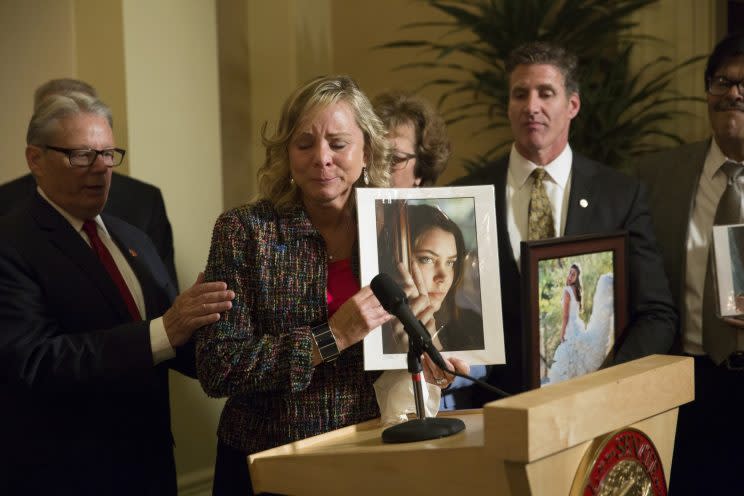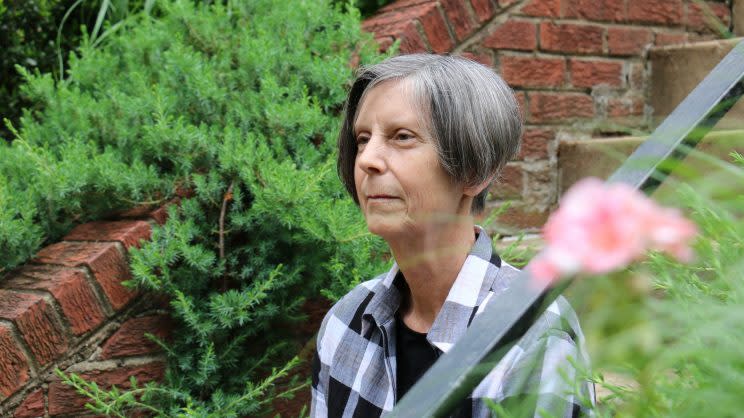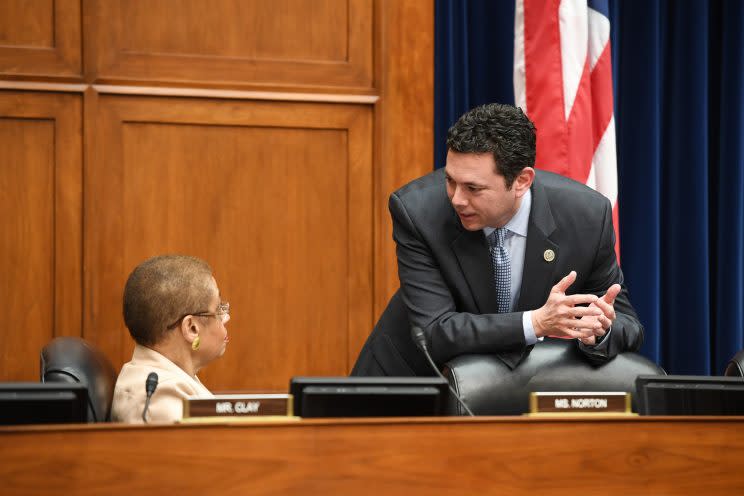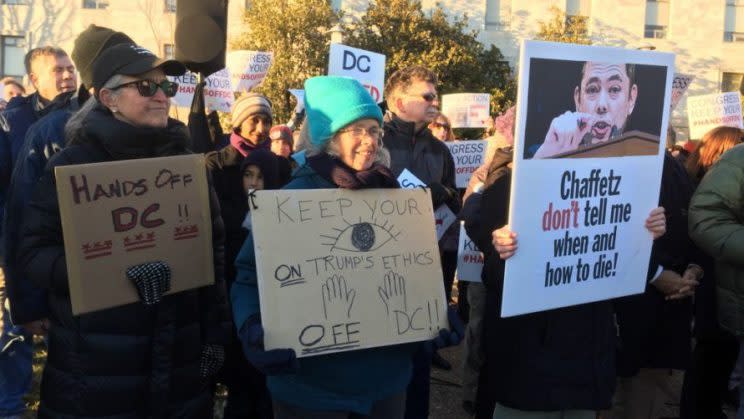Will Congress let Mary Klein decide how to die?
Mary Klein hopes the government will hurry up and let her die.
It’s not that she wants her life to end. To the contrary, she says, she is doing absolutely everything she can to live. That includes surgery to cut the cancer out of her ovaries, uterus, colon, diaphragm and stomach lining, followed by five separate months-long rounds of chemotherapy. But, she says, these life-extending options will stop working one day, and when they do she wants to be able to use a life-ending one, to die on her own terms and by her own hand.
Klein, 69, is a resident of Washington, D.C., the latest locus of the growing debate over laws allowing terminally ill patients to decide when to die. Last year, the district became the seventh jurisdiction in the United States to legalize what here was called Death With Dignity — joining Washington state, Montana, Vermont, California, Colorado and Oregon.
But D.C. is not a state, and here Congress can override laws passed by the local city government. In the months since the D.C. act was passed, national legislators have been aiming to do exactly that, trying first to vote to nullify it, and, when that failed, attempting to defund it. That puts patients like Klein in the position of fighting not only against their disease and for their cause but also, unexpectedly, for the rights of their hometown to govern itself.

The result is a race literally to the death. City officials including the mayor and the director of public health have said they are determined to implement the law before Congress can cut off the funding to do so.
“They are scrambling to get this done,” Klein says. “I just hope they do that in time.”
*****
When the first of these laws went into effect in Oregon in 1997, the commonly used term for a doctor’s legally writing a prescription for a fatal dose of medication was “physician-assisted suicide.” In the two decades since, proponents have taken to using the term “medical aid in dying” to emphasize their arguments that it is the patient who acts, not the doctor, and that the act is not actually suicide.
“This has nothing to do with suicide,” says Kim Callinan, chief program officer for Compassion and Choices, which was originally called the Hemlock Society when it was founded in 1980 and is now the largest group in the U.S. to advocate for end of life choices. “Suicide is a person ending their life when they otherwise would not have died. This is a person who is dying from a disease; the disease is taking their life, and this is a compassionate way toward that inevitable end.”
The Oregon law, which is the model for the five that came after, has stringent requirements for deciding who qualifies for such assistance. Patients must be older than 18, diagnosed with a terminal condition and have six months or less to live. They must make three separate requests (one written, two oral), prove they are a resident, and have three doctors agree that they are terminal and not making the requests because they are depressed. And they must be able to take the medication on their own, without assistance.

In the decade after Oregon made all of that legal, it was the only state in the nation to do so. Then, in 2008 Washington state voters approved medical aid in dying on a ballot initiative, in 2009 a Montana court declared there was nothing in state law that would make it illegal, and in 2013 the Vermont legislature passed the Patient Choice at End of Life Act.
But it wasn’t until 2014 that the issue jumped back into the national spotlight, where it really hadn’t been since Dr. Jack Kevorkian infamously took it upon himself to build a euthanasia machine back in the early 1990s. The face of the latest version of the debate was not an eccentric graying doctor but a vibrant young woman, 29-year-old Brittany Maynard, who moved from her home state of California to Oregon when she was diagnosed with incurable brain cancer, so she could legally end her own life.
Working with Compassion and Choices, she chronicled her decision in a series of Internet videos, and she got the public’s attention. When she died in November of 2014, a YouGov poll found that 39 percent of Americans knew her story. She also appears to have changed some minds: A Gallup poll from May of last year found that nearly 70 percent of Americans agree that terminally ill patients should be allowed prescriptions that would end their lives, a 10 percent increase over 2015.
Maynard’s husband, Dan Diaz, had promised her he would keep lobbying for an Oregon-like law in California, and one was passed there soon after her death. Similar legislation has been introduced in 26 other states over the past two years, nearly all of which are still pending. Colorado was the first of those to pass a law. Next up was Washington, D.C.

Mary Cheh, a D.C. councilwoman who is also a constitutional law professor, sponsored the D.C. bill with Maynard on her mind. She had thought of introducing assisted-death legislation as far back as 2011, she said in an interview, but decided the timing wasn’t right — the council was tackling other major social issues, like same-sex marriage and legalization of marijuana, “and there’s only so much change you can push through at any one time.”
But as an increasing list of states began to consider the subject, and she continued to hear from constituents who “wanted to die with dignity, with control,” Cheh drafted legislation, which she introduced in January of 2016.
She expected it would be controversial, and it was.
The Archdiocese of Washington issued a statement saying that “assisted suicide” violated the “sanctity of life.” The president of the Patient Rights Action Fund worried that insurance companies would see assisted death as a more economical option than paying for treatment, and encourage patients, directly or indirectly, to make use of the option. At least one group of physicians protested that “assisted suicide … goes against everything we are as doctors,” and advocates for the mentally ill expressed fears that the bill would lead to “doctor shopping” for a physician willing to declare a depressed patient to be terminal.

There were equally passionate voices in favor of the legislation. At a July hearing, 70 D.C. residents signed up to speak, and the event lasted nine hours. Among those heard that night were an elderly couple who vowed they would help each other die one day, two reverends who supported the bill, a breast cancer patient who was stable at the moment but wanted to have the option to act should that fight become futile, and a well-known D.C. restaurant owner with a rare and painful connective tissue disorder, who said he had considered moving to either Oregon or Washington state in order one day to do as Maynard did.
“I am fully prepared for the inevitable death that comes to us all,” said restaurateur Bill Warrell. “If I know mine is coming, and I believe it will be painful and prolonged, I want to be able to ask my doctor for an aid-in-dying prescription. What I really want to know is that I will be able to do that right here in D.C., in this beautiful and ugly city that I love.”
*****
Mary Klein was diagnosed with ovarian cancer in October of 2014, before the D.C. hearings began, before Cheh had even introduced the bill, and about a week before Maynard was on the cover of People magazine.
Until that diagnosis, her world was “basically perfect,” she said during an interview in her comfortable northwest D.C. home, on a leafy street abutting Rock Creek Park, a house filled with dog gates, mud mats and family photos. By way of illustration, she passed her hand around the living room where she sat, pointing first toward Stella Dawson, 63, her partner of 37 years, and then to her two German shepherds, 6-year-old Adina and 7-month-old Eiger, both of whom Klein trains for agility and obedience competitions.

“My life has been one adventure after another,” she said. “I’ve loved my life.”
“Fun,” Dawson said, holding her hand as they spoke.
“Fun, great fun,” Klein said.
“It’s not past tense,” Dawson said.
“No, not yet,” Klein said. “When I’m not terribly sick, and even actually when I am, we laugh a lot together. I am very grateful for that. I have not been afraid to take risks, because what propels me forward is believing in what I do.”
Much of their life together has been about standing up for their beliefs, Klein and Dawson say, beginning with the way they met — sharing a house with other staff members at the feminist news collective where they worked in the early 1980s. After that they lived around the country and the world — Chicago, Providence, New York, outside of Frankfurt and London — while Dawson worked as a reporter for Reuters and Klein as an artist, photographer and journalist. In 2004 they happened to be visiting relatives in Massachusetts on the day same-sex marriage became legal, so they got themselves a license and became the 13th same-sex couple to be wed in that state.
“Now we’re on the frontier again,” Dawson says of the fight for the D.C. law.
“There’s better frontiers to be at,” Klein says.
They are here after two rough years of treatment, during which it became clear that remission was not a possibility. Klein often lacked the energy to work on her art. She was regularly hospitalized with complications from the chemotherapy. She suffered nerve damage that made her less stable on her feet, and she had to change the competitions for which she trained the shepherds to ones that were less strenuous for both dog and owner. And there was almost always pain. “If I made it through a weekend without having to go to the emergency room, that was a really successful weekend,” she says.

As her options became fewer, she says, her determination increased. She had read of Maynard, and the state laws that followed, and when she heard that similar legislation was under consideration by the D.C. City Council, she told Dawson that she planned to use her limited energy to support the cause.
“I was not surprised at all,” Dawson says of her wife’s wish to die on her own terms. “Mary was always a very strong, very courageous, very independent person. I knew that she would want things on her own terms.”
Klein did not attend the nine-hour meeting on the bill last July, because she was undergoing her third round of chemotherapy “and my focus was on just getting through it.” By October of last year, though, she was on vacation off the coast of Virginia with Dawson when she read there was to be a first committee vote on the legislation. Cutting their trip short, they returned to D.C. and walked door to door from one council office to the next, telling Klein’s story.
“The word got out that there was a terminally ill woman…” Klein says.
“… just prowling the halls,” Dawson finishes her sentence.
“Every member, or their staff, took a meeting with us,” Klein finishes.
Her message in each office was the same: “I’m doing everything I can to extend my life, but when I have a short period of time left and am in intolerable pain, which is very likely, then I want the option to take medication and have a dignified and comfortable death. I don’t want to die totally drugged up, hallucinating, or in a coma unable to say goodbye. Everyone should have the right to decide how they want to die. Whatever their choice is, I respect that, and I only ask that they respect mine.”

*****
With each hearing, each meeting, each conversation, Cheh tinkered with the text of her proposed bill, D.C. Act 21-577.
When the director of the D.C. Department of Health, Dr. LaQuandra Nesbitt, questioned whether people would be allowed “to carry out their deaths in public areas … to view the sunset over the Lincoln Memorial while taking their last breath,” Cheh added wording that would prohibit patients from taking their final dose of medicine in public.
When Councilwoman Anita Bonds asked for a provision recommending that patients of faith might consult a religious adviser before choosing the aid-in-dying path, Cheh added that, too. “Might help, can’t hurt,” Cheh says.
All those changes helped the bill get through the council’s health committee, although Klein’s door-to-door lobbying seems to have provided the final push. David Grosso, an at-large independent member of the council, had been undecided until the Oct. 5 committee vote. He became the deciding vote in the 3-2 tally after some intense conversations with Klein.
“As a matter of principle, I believe that adults should be able to make choices about their own lives and bodies,” he said on the night of the committee vote. “It is hard for me to imagine telling a person in the final months of her life that she must continue to fight if she prefers to end things on her own terms.”
The vote of the full council a month later was similarly emotional. At one point during that Nov. 1 meeting, Councilman Kenyan McDuffie, who called this “my toughest vote in four and a half years in this body,” began to talk about his own father’s death. “My family had to watch him suffer. I wouldn’t wish that on anybody else,” he said, so overcome with tears that he had to leave the room.
The measure passed by a vote of 11-2. It was signed into law by D.C. Mayor Muriel E. Bowser on Dec. 19, 2016.
*****
The federal Home Rule Act of 1973 allows Congress to oversee what the D.C. government does. When Congress disapproves, the act provides two routes by which to undo the city council’s actions — voting to override the bill or to cut off its funding.
Nearly all every time Congress has exercised this power it has been on controversial social issues — abortion, needle exchange programs, rights of same-sex couples, decriminalization of marijuana.

The Home Rule Act says Congress must vote to override within 30 legislative days after the law in question is signed, and many in Congress tried to do that with Death With Dignity. In the Senate that effort was led by Sen. James Lankford, but his disapproval resolution didn’t made it out of committee. The House Oversight Committee, chaired by Jason Chaffetz, did vote, 22-14, to overturn the law. “Rather than facilitate suicides, the government’s role should be to prevent them,” Chaffetz wrote in a joint opinion piece with former Sen. Jim DeMint. “We should not now or ever take steps to help facilitate, encourage or tacitly accept measures that prematurely end lives.”
But that House bill never made it to a floor vote, and when the 30-day window closed on Feb. 18 of this year, the D.C. legislation became law.
That was not, however, the end of the fight between Congress and the council. In response to requests from several congressmen, the Trump administration’s proposed budget specifically prohibits the district from spending any funds to implement the new law. The cost of implementation is minimal, local officials say — basically it includes new software for the Department of Health computer system to track requests from patients and count prescriptions from doctors. And since estimates are that only 10 patients each year will request such prescriptions, it is not expected to be an overwhelming bureaucratic burden.
However small the numbers might be, though, the result is a direct confrontation between the two government bodies located in D.C.
“The hypocrisy is extraordinary,” says Cheh. “These politicians who preach local control, states as workshops of experimentation, want to tell our local government what to do.”
Eleanor Holmes Norton, D.C.’s nonvoting representative in Congress, agrees, while also hoping that on this issue momentum is on the district’s side.
“Why didn’t it get a floor vote?” she asked in an interview. “Because this is a rolling stone as more and more Americans are understanding this issue. There are now 24 House Republicans, two of them in the leadership, who are from states where Death With Dignity is the law. To vote against it in D.C. means voting against what their constituents believe in at home. I am optimistic, which is a very difficult and rare word for me to say. We have to fight like the world is coming to an end for each and every thing we’ve saved, but I think we might be able to save this.”

Call it cautious optimism. In case the funding restrictions do pass, Mayor Bowser and Health Director Nesbitt have assured the council that they are scrambling to beat the clock and to fund the necessary implementation before the next budget takes effect on Sept. 30.
For Klein, though, that date feels very far away.
It might surprise some, but she is not at all sure she will actually exercise the right she is fighting so hard to have. “I can’t tell you with 100 percent certainty that if I had the medication I would take it,” she says. “But I do know that it would bring great comfort to me to know this is a possibility.”
Statistically, many others feel the same way. In the 20 years medical aid in dying has been legal in Oregon, 1,327 patients have been granted prescriptions but only 859 have actually used them. Some quickly became too ill to act on their own, but for many, just knowing the choice was theirs was the reassurance they needed.
Before she makes that choice, Klein is making others — all of which add up to a resolution to live life as completely as she can for as long as she can. She and Stella are planning to head back to the beach where their vacation was interrupted last summer. There she will work on training their new puppy, a rambunctious energetic dynamo who seems blessedly unaware that his human is not as steady on her feet as she once was, not as able to roughhouse back.
Why get a new dog when you might soon be too fragile to even walk him?
“So I can live my life exactly as I want, until I decide to stop,” Klein says.
_____
Read more from Yahoo News:


